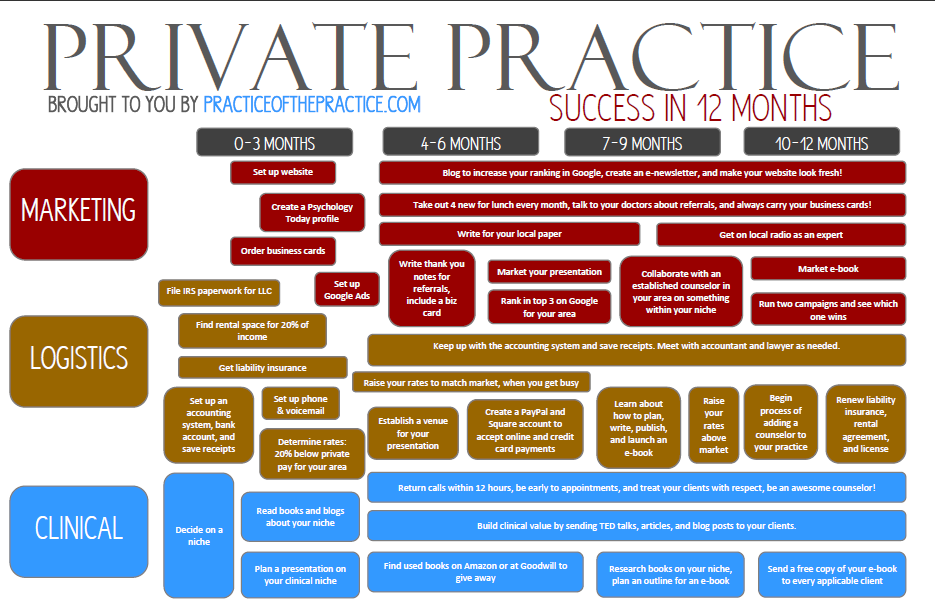By: Jennifer Behm, MA, EdS, LPC, MindSpring Counseling & Consultation, PLC
Have you been thinking of starting a private practice and wondering whether you are ready to take that leap? There is much out there on the “how to.” Practice of the Practice is an excellent source, providing you with step-by-step insights on how to get started. After looking at the list of “to-dos,” have you asked yourself if you have what it takes to accomplish these?
And what about maintaining this successful practice?
What does it take?
Can you do it?
I started my private practice the day I passed the LPC exam. During my residency, I observed leaders in the field and spoke to business owners to learn their secrets. Below are five traits I have observed in successful private practitioners.
- Altrepreneuristic
- Self-Assured
- Well-organized
- Self-Motivated
- Resilient
Successful private practitioners are altrepreneuristic
Merriam Webster defines altruism as the “unselfish regard for or devotion to others.” Altruism is often the driver for those in counseling professions (Cline, 2011). However, when considering running a private practice – a business – this unselfish regard for others often clashes with the reality that the end of the month is coming and you’ll have to pay your rent and utilities.
Before entering the counseling field, I worked in the corporate world and was blessed to work for an entrepreneur who while recognizing that the business needed to maintain financial strength and stability, also sought to be caring and fair to his employees. Noting the clash between altruism and entrepreneurism, in a quarterly meeting he said, “While I’d love to send you all to Disney World, that would jeopardize the financial strength and stability of the company”. He then invited us all to help him find a balance between meeting and exceeding employees expectations and maintaining corporate strength and stability.
The first consideration in running a successful private practice is to reconcile any dissonance you might feel as you seek to balance altruism and entrepreneurism. I recently spoke at a conference with a dear friend and mentor, Dr. Jennifer Cline, who has done considerable research on running a successful private practice and has been successful in her endeavor for years. In her research, she found that Bernie Nagle and Perry Pascarella (1997) coined a word to describe the marrying of these seemingly disparate concepts: altruism + entrepreneurism = altrepreneurism. So, yes, it’s okay to have a strain of entrepreneurism running through your veins. In fact, it’s necessary! Remember, if you send all your clients to Disney World, you won’t be able to pay your bills and if you can’t pay your bills, you have to take down your shingle.
Some questions to ask yourself after assessing fee structures in your community:
- Do I feel guilt or reticence about charging market value for my skills?
- What stands in the way of me charging what I am worth?
If you are challenged by the questions above, you have an opportunity to do some personal work before proceeding with your business plan. In fact, unresolved dissonance surrounding altruism and entrepreneurism will adversely impact your confidence and this will negatively impact your marketing ability and ultimately your business success.
Successful private practitioners are self-assured
Self-assurance or confidence is needed not only for sitting with clients, but also for marketing yourself. As you may have noticed on this Practice of the Practice website, Joe has a “Private Practice Success in 12 Months” graphic that has an entire section devoted to marketing.
Download it here: Launch a private practice infographic
You have heard that it only takes seconds to make a first impression. People notice what you’re wearing, your comportment and how you speak. These things play into your perceived level of self-confidence. Most counselors are introverts so selling yourself to people you don’t know can feel especially draining. Counselors, here’s an opportunity to create new neuropathways through role-play. You may find it helpful to seek feedback from a trusted colleague on how confident you come across to others.
Certainly, we need to do the research and undergo the training necessary to be counselors. Having done that, what are the messages you have been telling yourself?
- If these messages have not been beneficial, there are several tools out there that can help.
- In addition to counseling (yes, counselors, we need to reach out for help too!), Thought Field Therapy is an energy psychology tool that can help with self-affirmation.
- I find that my faith base informs my confidence in that it accurately informs me of who I am.
- I believe there is a plan for my life and I am walking through open doors until one closes. A closed door simply means a different plan. If I’ve been given a job to do, surely, I will be given the tools to accomplish this job.
Successful private practitioners are well organized
You may have seen some very good clinicians who assumed that because they are good at counseling they should open their own practice yet upon doing so became so buried in administrative that they had to close shop.
Organization is a trait that allows for a bit of cheating but the key is to know yourself. There are many administrative helps out there. Most cloud management systems will make reminder calls, allow clients to set their own appointments, assist with billing, and provide clinical note formats to follow. If you fear falling behind on filing for insurance reimbursements and if finances allow you can also hire a bookkeeper. Practice of the Practice offers a cornucopia of advice and insight on getting organized to launch your practice (Here are a bunch of articles about launching a private practice).
In addition to organizing the mechanics of your practice, you must also assess the efforts you have put into building your practice.
- Which advertising venues are having the best payoff? (Here’s the ROI Calculator that will help)
- How are my cancellations and no-shows trending?
- What is my average collected fee? It is best to organize your schedule so that these assessments occur monthly, quarterly and annually.
Successful private practitioners are self-motivated
The first year of my residence I worked in a clinic setting. I came in to work twenty minutes prior to my first client and picked up my schedule for the day. At the appointed time I walked out to the waiting room and called my client’s name and we strolled back to my office. I don’t know how the clients showed up on my schedule – they were just “there”. I didn’t know anything about the marketing or billing processes. At the end of therapy, I just walked the client back out to the receptionist and “Toodle Loo until next time!”
If you have worked in a clinic or institutional setting you too may have been shielded from the many details involved in running a private practice. In this blog, you have read about some of these details and Joe has provided you with many of these as well. Consider all the things you don’t want to do – perhaps administrative, maybe marketing? What is the likelihood that you will be able to overcome the inertia that has kept these things at the bottom of the list?
When discussing change, I have often told clients, “If not you, then who?” “If not now, then when?” These motivating prompts also apply to the practitioner considering private practice. There is no one but you to accomplish the goals of your practice. If you don’t pay utilities on time, you suffer the consequences. If you don’t keep up on insurance reimbursement billing, you will not get paid. If you don’t keep up with your clinical notes, no one will nag you. If you are one who feels some anxiety about going home at the end of the day without your notes completed, it is likely that you have a degree of self-motivation.
Self-motivation is also necessary for marketing your services. Even though you may be an introvert, do you have the motivation necessary to make the appropriate contacts to promote your business? If not you, then who? If not now, then when?
Successful private practitioners are resilient
Especially in the nascent stage of building your private practice it is normal to meet with setbacks. It is imperative that you continue toward your goal with unwavering focus.
One day upon getting into the car to go to work, I noticed a spider on the outside windshield. The spider held on as I drove down the driveway. I watched with interest as my speed increased and the spider’s legs started to shake but he did not waver. He held on until I hit 60mph! Now that is resilient unwavering focus!
As counselors we know that hardship can be the mother of resilience. Do you know that Michael Jordan missed over 9,000 shots? Or that Walt Disney went bankrupt in his first attempt and was subsequently turned down over 300 times before getting financing for Disney World? J.K. Rowling met with many failures before becoming a household name. In her address to Harvard’s graduating class she said, “You might never fail on the scale I did, but it is impossible to live without failing at something, unless you live so cautiously that you might as well not have lived at all—in which case, you fail by default.”
Of course no one wants to fail and the fact that you are reading this means you are not haphazard in your approach. You are doing your groundwork. Your diligence in an honest self-assessment will work to your advantage. Research on brain neuroplasticity demonstrates that you can teach old dogs new tricks. So, the good news is that all of these traits, even resilience, which is informed by perspective, can be improved upon with some work.
Meet Jennifer
 Jennifer graduated with honors from James Madison University’s Clinical Mental Health Counseling program with a Master’s degree and an Education Specialist Degree.
Jennifer graduated with honors from James Madison University’s Clinical Mental Health Counseling program with a Master’s degree and an Education Specialist Degree.
A published author, Jennifer’s 2012 article, Rogers Revisited: The Genetic Impact of the Counseling Relationship was recognized as one of the top ten articles published in the American Counseling Association’s peer reviewed online journal, VISTAS. The Jennifer has also presented on various topics at counseling conventions.
Jennifer operates a private practice counseling adults including couples, groups and individuals. Favoring a client-centered approach to counseling, Jennifer honors the individual, recognizing that people are resilient. When providing a counseling environment of unconditional positive regard, people experience change.
Experienced at the corporate level of Human Resources management, Jennifer also provides corporate coaching and soft skills employee training.
References
Cline, J. (2011) To market, to market: Growing a private counseling practice in a small community. Unpublished manuscript.
Merriam-Webster (2015, November 10) retrieved from http://www.merriam-webster.com/dictionary/altruism
Nagle, B., & Pascarella, P. (1997). Leveraging people and profit: The hard work of soft management. Maryland Heights, MO: Elsevier Science.
Rowling, J. (2015, November 12) retrieved from www.Jkrowling.com
Looking for a great electronic medical records solution?



